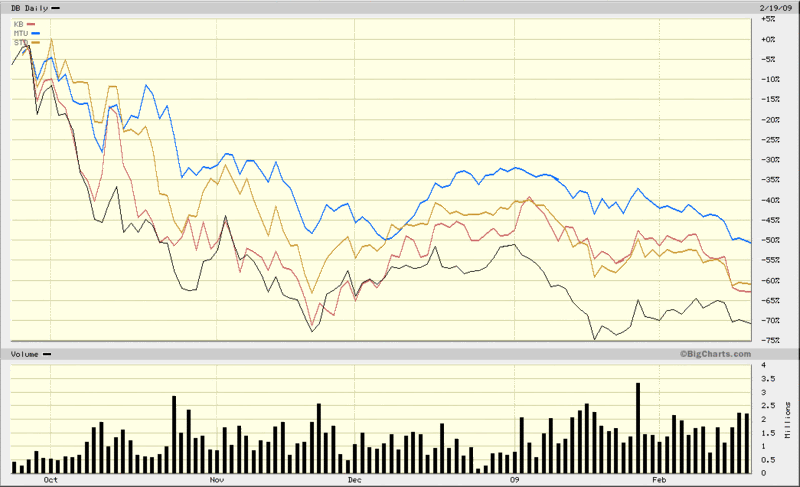Global Bank Stocks in a Post-Lehman World
I get tired of talking about the banks, but it is the story for the foreseeable future. While Citigroup’s (C) common stock flirts with the 2.00 line (can we call it Bank of Mendoza?) and insists it has not had conversations with the government about nationalization, Bank of America (BAC), whose stock is barely above the 3.00 level, is also out saying, “We see no reason to nationalize a bank that is profitable, well capitalized and actively lending.” Add to the financial stew a Wells Fargo (WFC) stock under 10.00 for the first time since 1996 and it is hard not to be obsessed by the banking sector.
For all the discussion of U.S. banks, I wish to turn to the global scene. Lately U.K. banks and Irish banks have been the target of rumblings about possible nationalization, so I am going to skip over banks from these countries and instead focus on the largest banks in two critical European countries (Germany and Spain) and two critical Asian countries (Japan and South Korea). These four banks are Deutsche Bank (DB), Banco Santander (STD), Mitsibushi UFJ Financial (MTU) and Kookmin Bank (KB). All four banks happen to trade in the U.S. via American Depository Receipts (ADRs).
In the chart below, I have graphed the performance of all four giant banks since the last week in September, when the ripple effects of the Lehman bankruptcy and nationalization of AIG began to be felt across the globe. Not surprisingly, all four banks have seen their stock prices fall by more than 50%, with Deutsche Bank the worst performer among the group and Mitsibushi UFJ Financial feeling the least amount of pain. For comparison purposes, most of the Irish and British banks are down more than 90% during the same period.
The global banking crisis obviously has a long way to go before anyone can say with confidence that it is behind us. In the interim, even a medium-sized bank from a country most U.S. investors are not watching closely can lead to another tipping point that puts the global financial system closer to the brink. Investors seeking to keep a weather eye on global financial firms may also wish to monitor closely the iShares Global Financials ETF (IXG).

[source: BigCharts]


4 comments:
The banking regulations of countries must have some effect on a banks financial performance since wide discrepancies exist between the largest U.S. and Canadian bank. C peaked at about $55/share in May 2007 and it traded down to about $38/share near the October 2007 peak in the U.S. stock markets. RY, Canada's largest bank, peaked at about $59/share near the October 2007 stock market peak. C decreased about 95% since the October 2007 stock market peak and RY decreased about 64% since that time. Record residential real estate foreclosures do not exist in Canada.
Good points, Anon.
Speaking of foreign banks, John Hempton has an interesting piece out today that makes for some interesting reading: We Are Not Close to Being Swedish Yet
thats right. this crisis got a long way to go. thats why setting VIX:VXV range bounding strategy is very risky way to trade. buying decision when the ratio hits "upper" bound is like saying its time to buy when the market enters the oversold condition. during a bear market, fresh oversold condition only confirms the bear market trend and it's likely to be more oversold. even when VIX:VXV begins to retreat from fresh new record high, its still too dangerous to jump back in... why? the forced liquidation and redemption continue. i like your blog site... but its such a big turnoff whenever u come up with the quick buy call. can we just focus on just vix related matters? instead of trying to make a buy/sell prediction?
lol.. bank of Mendoza. Can i quote you ?
Bear in mind this residential crisis starts out in uber-desirable, warm, places to live (LA,Arizona, Nevada.. Spain's Costa del Sol). That explains the difference between Canada's mortgage situation and ours, imho.
Post a Comment